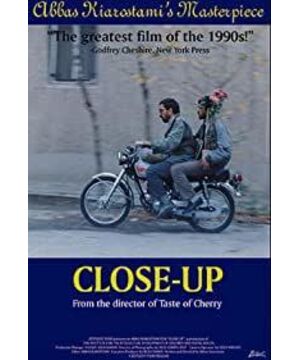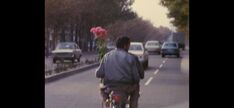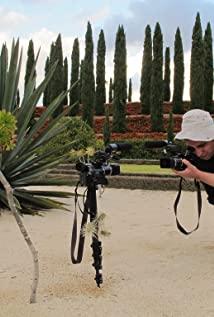text丨flat
I always feel that Abbas never regards movies as movies. In his hands, movies are like toys, the boundaries become blurred, and it is not surprising to wander freely between feature films, documentaries, and experimental films.
Born in Iran, an Islamic country where the censorship system is 100 times stricter than China, it is difficult for creators to express some discussions that "damage" their country's image. Many Iranian directors dance under heavy shackles in the way of "seeing the big from the small and innuendo". , Similarly, most of Abbas's films are also "drunk man's intention is not alcohol", for example, I thought that "The Taste of Cherry" clearly talks about suicide, and it is ironic that soldiers lose their youth for the national war.
The same is true for this film, which clearly states that a poor boy pretends to be a director to swindle and deceive, but in fact reflects the hardships of some Iranian people at that time, and exposes the elites' rush to pursue the upper class, and the double standard of "judging people by appearance" to the toiling public.
As for whether the author is over-interpreting this expression, I will demonstrate the above analysis of "social class" from the following aspects.
First of all, in terms of directing skills, those who are familiar with Abbas may know that he has always explored the "boundary between film and reality". The film often uses a large number of extreme fixed-camera long shots, and the performance of amateurs is pure and natural. Very dramatic thing.
Strictly speaking, the film is like a fake documentary. Especially the insertion of "Abbas" himself, as well as the process of filming the trial of the fake director and the follow-up process by him and his team, the design of the details of the microphone failure on the real director in the last paragraph, emphasizes this point, and also makes the film form a "in-play" This is very similar to the technique of "The Lover under the Olive Tree".
Secondly, in terms of characters, the key characters in this film are: reporter, two policemen, taxi driver, fake director, rich family, Abbas, and real director. I think these people can actually be divided into two categories:
A: The two policemen, the taxi driver, and the fake director are ordinary people.
B: A reporter, a rich family, a real director, Abbas is an elite class.
Everyone in the ordinary class has their own drawbacks: the two policemen are only serving military service, one is unmarried, has no bus to perform official duties, and has to take a taxi paid for by the reporter; the taxi driver was actually the target of the reporter at the beginning. , after a series of reporters asking for names, he changed his attitude after revealing that he was a retired brother from the Air Force. It was a bit of a hero who was bullied by dogs; The children are also unemployed and the poor who make do with their mothers.
On the elite side, the reporter went to a wealthy family with the mentality of grabbing big news and becoming a hit. In fact, he was trying to break through the class barriers and move up, although he could not afford the full fare, and secondly As a reporter, I don’t have a portable tape recorder, but I can still despise the military driver. I even used the can as a game play when the driver was waiting for others. When he got the tape recorder, he happily kicked it away. This eagerness to break through is deeply buried. , it's not a long and meaningless idle pen at all; the rich family's family layout is clearly divided into classes, so I won't go into details. The real director, the class of this role is actually very high, otherwise the rich will not admire him without seeing him, and the poor will not want to play him; as for Abbas, as the two directors inside and outside the film, both It is the elite class. In the play, the real director is already very good, and Abbas himself hid in the car and recorded him taking the poor to the rich to apologize. He is actually standing on a higher commanding height. Fusion, when ridiculing others, even oneself should be black and generous.
As for why you are forced to say that the director is expressing class, have you thought carefully about why it is called a close-up?
Close-up, which is originally a film term, means that only part of the character's body is shown, and the scene is very tight - such as a big head. As the title of the film, it is actually the "decoding key" of the metaphor of class. Think about this interpretation carefully. In fact, Abbas himself was at the trial scene, and he had already told everyone. He also mentioned that he would use two scenes to shoot the court trial, one for a panoramic view and one for a close-up. Director - that's the code.
Recall that the entire trial process was actually very "Rashomon". In a panoramic environment, we see judges, wealthy families, reporters, etc., and we will think that this ugly poor man is too good at covering up and heinous. But, immediately return to the close-up of the poor man's big face, gushing explanations and digressions, and you will wonder how such a kind-hearted and slightly dull person could be a bad person. Immediately afterwards, the feeling of such a gap was staged in the courtroom, and the audience's judgment on the poor was also uncertain, and even finally raised the topic of what is the real director, which makes it difficult to make a conclusion, and the in-laws are justified.
In the end, we came to the conclusion that the director is just an identity, not rich or poor, but in life, where can the poor who really care about art get a chance to "close-up"? !
His fault is not in pretending to cheat, but in - he is poor.
It is worth mentioning that there is not only a fake director who can feel the real art in this way, but also a retired Air Force driver who has experienced war - he can pick up flowers from the ruins of the rich man's house and put them in the car while waiting for others. Front mirror, lightly kick the can to watch it roll away, and enjoy the little things in life. Then, in the end, the fake director, accompanied by the real director, sent a bunch of fresh flowers, which made the door of the rich again fragrant. Did the rich forgive the poor, or did the poor enrich the rich?
We who usually only use the "panorama" to see people and things, may have to look for our "close-up".
View more about Close-Up reviews








